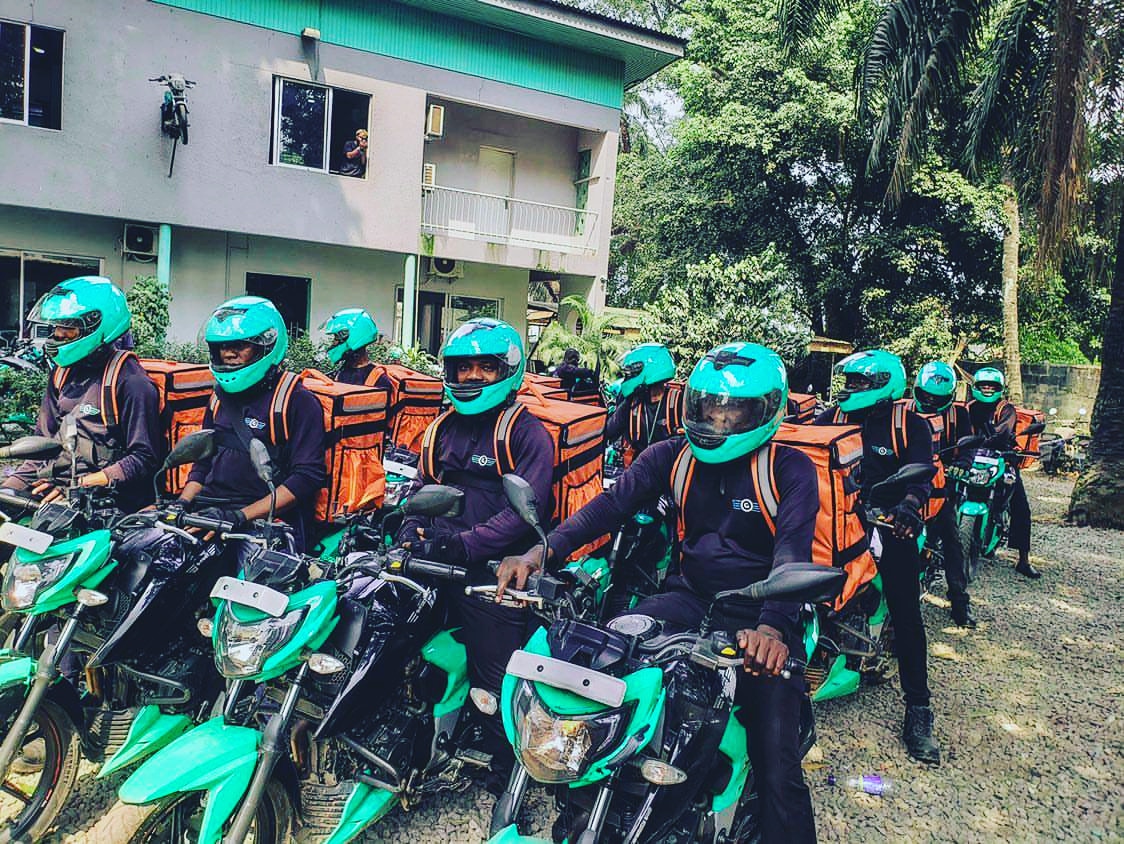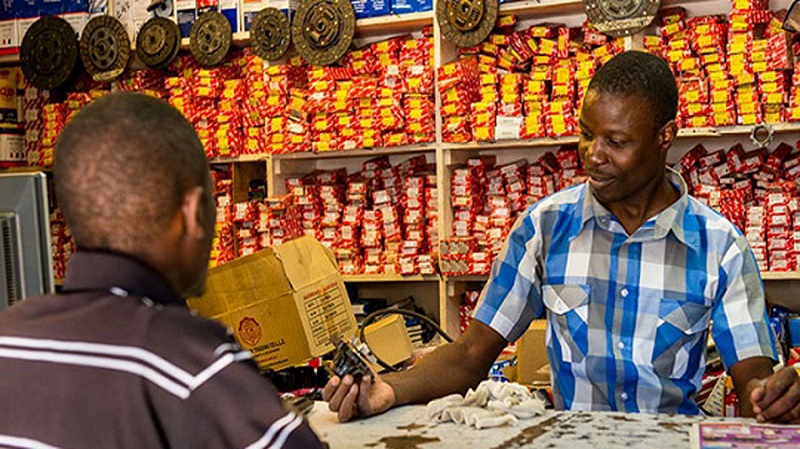Gokada’s CEO, Fahim Saleh thinks his collapsed bike hailing operation is perfect for the logistics industry.
Gokada was badly affected when the Lagos government implemented the ban on passenger motorcycles in February. Unlike other bike hailing companies like MAX and OPay, the ubiquitous Gokada had only one market (Lagos) and offered only one service (bike hailing).
Founded in 2018, Gokada is one of two companies that pioneered the bike hailing innovation in Nigeria. But in February its future looked bleak. A company that had raised $5.3 million barely a year before was on the verge of collapse. It tried one last time to avoid the ban.
Gokada formed a coalition with other bike hailing companies to protest and lobby the government to relax the rules. In a coordinated manner, hundreds of bikers took to the streets with placards en route to the Lagos State House of Assembly.
The move failed; the government didn’t yield. The ban kicked in on February 1. Bike hailing services have not transported a single passenger on any of the restricted locations since.
Two days after the ban went into effect, Gokada’s CEO, Fahim Saleh laid off roughly 80% of its workforce. The company announced a pivot into delivery services and wanted to conserve enough cash for its runway in the new business.
While that decision was rushed, early indications show Gokada’s pivot is paying off. The recipe for this is Saleh’s past experience running a bike hailing service in Bangladesh.
Its new growth is thanks, in part, to Saleh’s prior logistics experience in Bangladesh, his home country.
From Pathao to Gokada; the Origin Story
After developing a popular prank calling app, Saleh left New York, US for Dhaka in 2014. “I decided to go to Bangladesh where my family was originally from and I started a couple of projects,” he told TechCabal.
He started a tech incubator to try out different innovations. Most of them failed. The one that really took off was Pathao, a logistics service.
Pathao is named after a Bengali word for “send”. The company uses motorcycles and bicycles to make deliveries for merchants. It started out with 100 motorcycles and 100 drivers in Dhaka, Bangladesh’s capital city with a population of over 20 million.
Saleh helped the company raise early-stage funding while his two co-founders led the company as CEO and CTO. “This was my first time actually receiving any investment,” he told TechCabal.
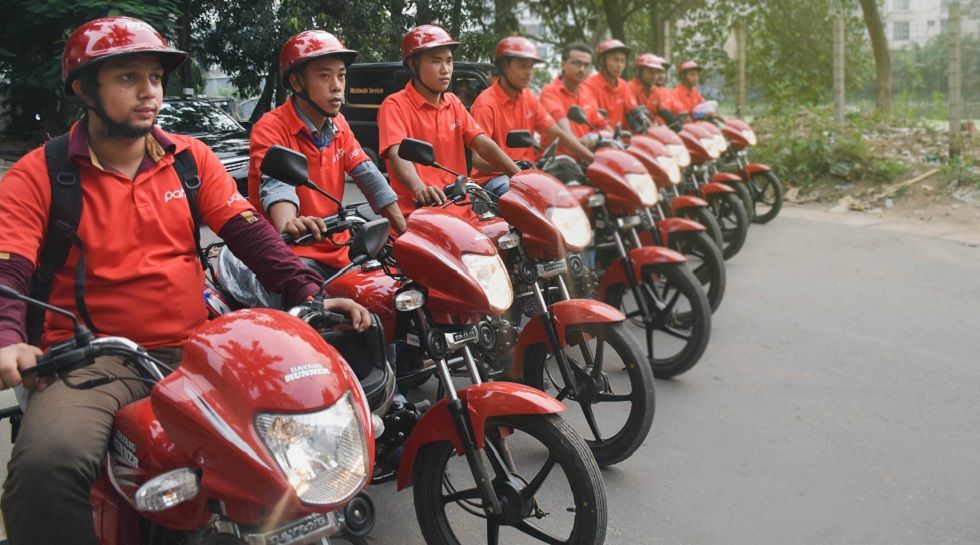
In 2016, Pathao started offering passenger transportation as a bike hailing service. This was not the original plan. It wanted to remain a logistics company. However, Saleh’s whole outlook changed after meeting with an investor who backed Go-Jek, Indonesia’s billion-dollar bike hailing.
“We decided to push Pathao in the same direction,” Saleh said.
But that path wasn’t smooth. Existing transport laws ruled out the use of private vehicles for passenger transportation. In November 2016, the Bangladesh government declared ride services illegal, affecting the businesses of Pathao and even Uber.
Intense lobbying followed as these companies tried to convince the government to formalise the industry. It paid off. By December 2017, the government drafted formal rules and Pathao was allowed to operate legally.
Following the playbook of Go-Jek, Pathao has since morphed into a transport superapp offering food deliveries and ride-hailing. Its success in Bangladesh attracted Go-Jek which invested in two of its funding rounds.
In April 2018, Pathao was valued at $100 million after its $10 million pre-Series B round. Go-Jek was the lead investor for that round.
Saleh sold some of his shares in Pathao and returned to New York.
He decided to try out the bike hailing model in a different country. He ruled out countries in Europe and North America. They are not “in the realm of possibilities”, he wrote in a blog in 2018.
Saleh decided to launch his new bike hailing adventure in Nigeria believing there are “untapped potentials” in developing nations.
“I had some money so I decided to go to Nigeria and try it out,” he said. “[I] wanted to see if there was a future in motorcycle ride-sharing transport in Lagos.”
During his market research, Saleh visited the West African country in 2017. “I saw that there were over 8 million registered okadas,” he explained, “[and] there was no real app at the time that aggregated these bikes and tried to make better quality and make their fares transparent.”
Pioneering bike hailing in Lagos
Gokada started the same year with a focus on bike hailing. A combination of two words, “go” and “okada”, the company name was inspired by Go-Jek.
Expansion to other transport options like water transport was part of the original plan. “Water surrounds Lagos but there’s no significant boat traffic,” Saleh told TechCabal.
Bike hailing had never been tried in Lagos. But existing transport laws banned motorcycles below 200cc from operating on over 400 major roads. Saleh thought he found a way around the law.
He assembled a local team, recruited bikers and acquired dozens of 200cc motorcycles for bikers. While it charged a fare for rides, Gokada used the hire purchase business model, allowing bikers to use its 200cc bikes and repay a fixed amount daily.
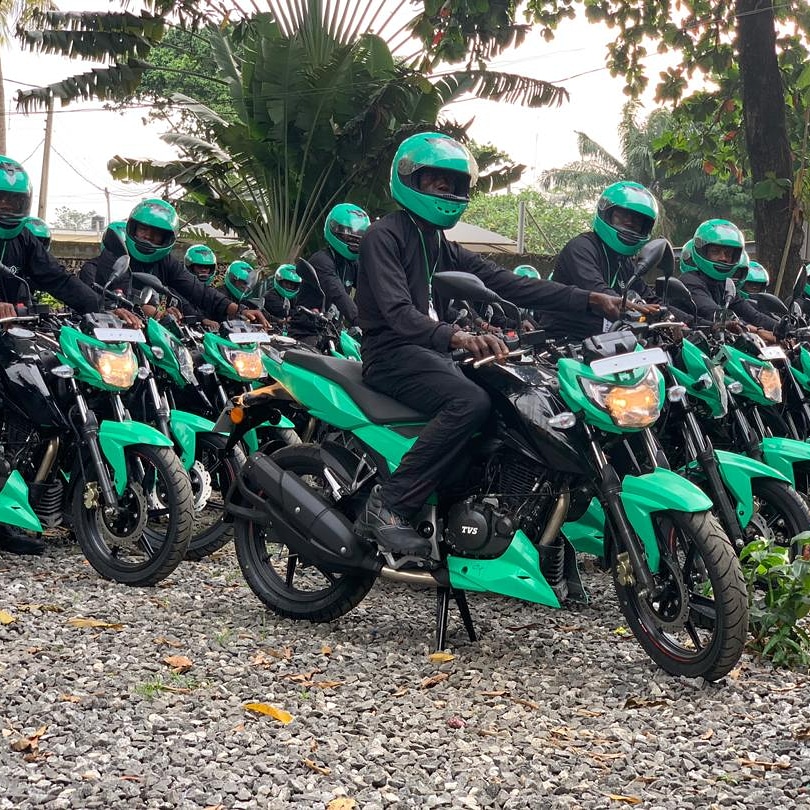
“Our model used to be ₦4,000 per day for each driver,” Saleh revealed. “We were going to raise it to ₦5,000 once we added driver services that would give riders a lot of benefits like medical and financial services.”
By mid-2018, Gokada launched its app and its first set of bikes went on the streets. Within a few months, its turquoise-coloured helmets could be found in major bus parks in Lagos.
Although it was more expensive than regular bikes, Gokada gained traction quickly. Its launch coincided with numerous construction projects in Lagos that significantly worsened traffic for months.
Thousands of middle-class Nigerians and white-collar workers frequently adopted Gokada and other bike hailing services for their commute to beat the traffic.
At its peak, the company had 800 bikers in Lagos doing over 10,000 trips per day, Saleh told TechCabal.
Business was good. The company raised $10.6 million in funding after four rounds. Its last round was a $3.3 million raise in June 2019 according to Crunchbase. Gokada was on track to break even by January 2020, Saleh told TechCabal.
But everything went sideways in a colossal manner
Struck with the Lagos ban on passenger motorcycles
“The [okada] ban basically came out of nowhere,” Saleh said. For two years, Gokada and other bike hailing services operated in a regulatory grey area. There was always an existential risk. Should the government fully enforce the road transport laws, bike hailing services would face a major challenge.
By June 2019, new trouble started with the transport unions. The unions demanded a daily levy from each biker affiliated with a bike hailing service. The dispute continued for the rest of the year.
In late January, the government announced it would ban motorbikes from six of 21 local government areas. These six locations represent Lagos’ commercial capital, housing many of its companies and residential neighbourhoods. Passenger transport in these locations represented the largest part of bike hailing revenue.
“Granted that we had a lot of conversations with the government we thought there would be a significant heads up before something like this would happen,” Saleh said.
He attempted an emotional appeal to the government using a video posted on YouTube. It backfired, and Saleh was criticised on social media for how his bikers were portrayed in the video.
The ban went into effect barely one week later. Gokada’s bike hailing business was done, at least for the short term.
Six months before the ban, Saleh made a gamble. He had bet the future of his company on new bikes. In August 2019, he shut down Gokada’s bike hailing operations for two weeks to retrain bikers. Hoping to convince the government that Gokada was safe, he acquired 1,500 new, more expensive motorbikes to replace the existing ones. One anonymous source said the new bikes cost about $1,500 each.
Saleh didn’t deny this. He confirmed to TechCabal that he bought 1,500 new bikes for $1,200 each, and spent another $450,000 on new phone helmet gears for each of the bikes. The new helmets cost $300 each. In total, Gokada spent an estimated $2.25 million on these new bikes and helmets; roughly 21.2% of its total fundraising since 2018 and more than 40% of the $5.3 million Series A it raised in May 2019.
Despite this huge spending, Saleh maintained the company was on course to break even by January 2020 and could turn a profit in subsequent months. There was also an international expansion plan in the works.
But when the ban kicked in, Gokada had to pivot or die. It paused bikers’ repayment under the hire purchase model till it figured things out.
One option was to expand outside Lagos. Ibadan has become quite attractive to bike hailing companies. Saleh ruled this out.
“The most earning power in all of Nigeria was in Lagos,” he said, “how much are we going to get if we took these expensive bikes to other states?”
“It just feels like a misuse of an asset,” he concluded.
Pivoting to delivery services
When Gokada launched in 2017, Saleh ruled out logistics services. “I just assumed that the delivery market was something not worth looking at because it seemed to already have a lot of competition.”
However, the ban prompted a “completely different shift” in mindset. Gokada quickly saw new opportunities in logistics and realised it could compete favourably in this market.
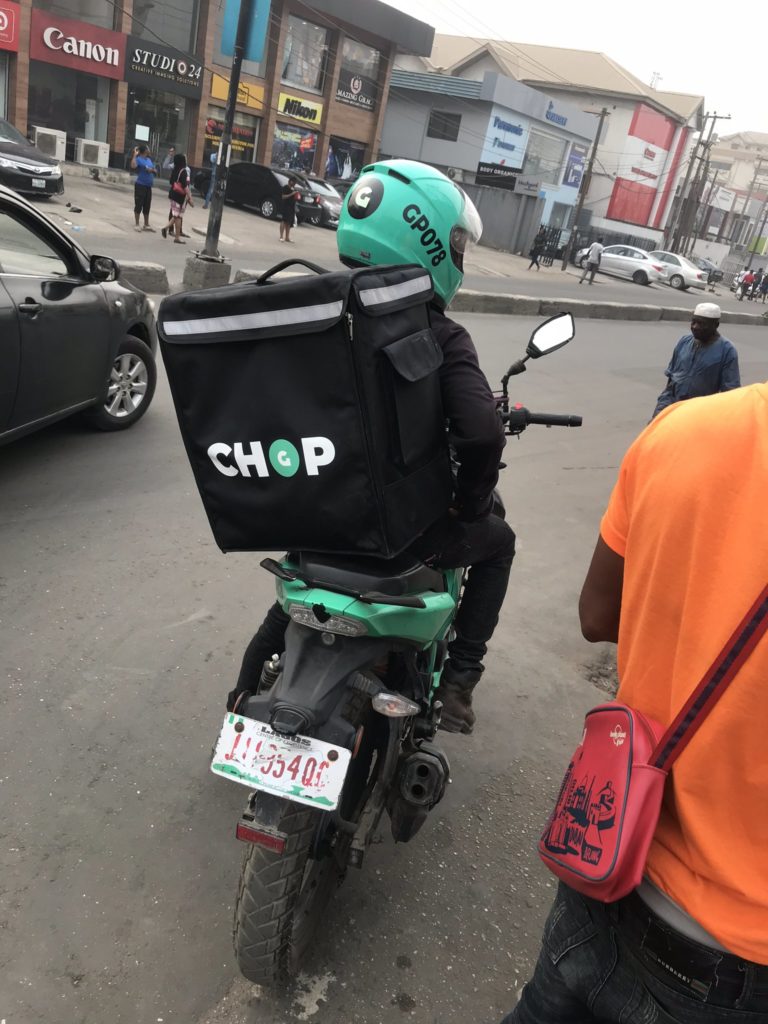
The logistics industry in Lagos has predictable regulations and only allowed the use of bikes with 200cc. Most delivery companies are fragmented and have a relatively small number of 200cc bikes. Gokada has 2,000 of them and 800 bikers.
“That’s a major competitive advantage in Lagos,” Saleh explained.
Gokada quickly updated its website and app. The original bike hailing footprint, a consumer-facing business, is gone. It has now found life as a delivery business, a B2B operation.
It abandoned the former hire purchase model. Since the pivot, it now rents its motorcycles to bikers for ₦2,000 and ₦3,000 per day.
Some of its riders are assigned to merchants, while the others simply pick up any order that comes in. “Depending on that, we charge riders a daily fee,” Saleh explained. So far though, only 250 of its 800 bikers are making deliveries.
It has also secured partnerships with a number of companies to fulfil deliveries. In February it partnered with Jumia Food to deliver groceries and cooked meals. Gokada also provides delivery services for Lifestores, the tech-enabled pharmacy startup.
Saleh is bullish on Gokada’s growth potentials. “I think we’ll probably hit as many deliveries per day as we were doing before the ban within the next two or three months.”
Reliving his experience running Pathao in Bangladesh, Saleh sees a shot for Gokada to go bigger in Lagos. “I don’t think anybody has really cracked the code on how to do it well yet,” he believes.
Gokada plans to setup delivery central points to batch items for different locations. This means orders destined for particular locations will be organised accordingly and each biker could fulfil more deliveries per day. “This is how you reduce prices by half,” Saleh explained, “and in the next couple of months, you should see our prices go down.
As confident as Saleh is, competition in the logistics space is getting heated. GIG Logistics is one of the biggest operators in the sector and it has excellent brand visibility. Although it is a legacy operator, GIGL is modernising fast, digitizing its operations and plotting to use more motorcycles for faster deliveries.
Red Star Express, another legacy business is also a key player in the logistics business and operates its own fleet of bikes.
Kwik Delivery, a relatively new on-demand logistics service, is growing quickly. Like Gokada, it uses a fleet of motorbikes to deliver parcels in Lagos. The company is reportedly raising €2 million for expansion.
Other bike hailing companies have also entered the logistics space. MAX is a natural in this space. This was its original model before it flagged off its passenger transport operations. ORide, the one-year-old service, recently created OExpress, its logistics arm.
There is another twist to the new competition in the logistics space. After originally amassing a high number of 200CC motorbikes for passenger transport, ORide is now selling some of them. With these bikes reportedly selling for less than ₦280,000, other logistics operators are snapping them up to shore up their bike fleet, increasing the number of bikes in the space.
But while competition heats up, the government regulators are taking notice. The Lagos government is planning to step up enforce logistics regulations, while national logistics regulators are lurking.









